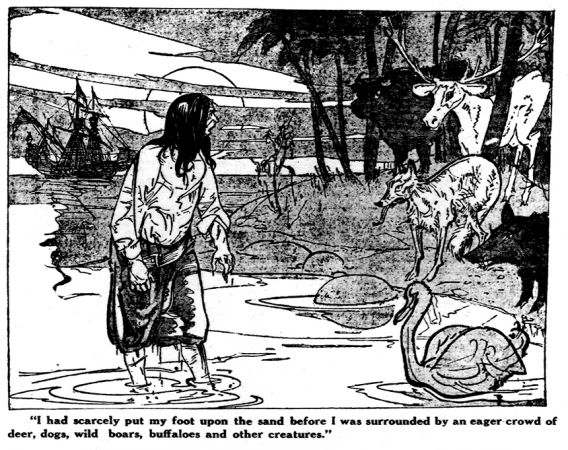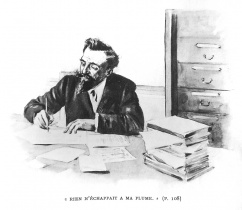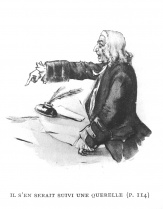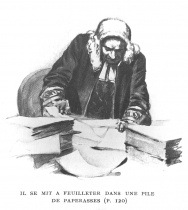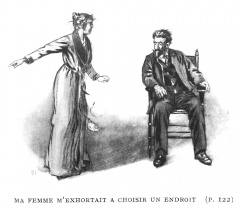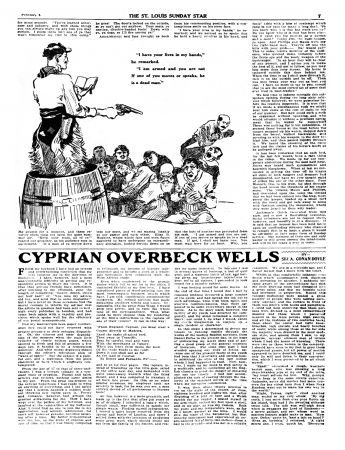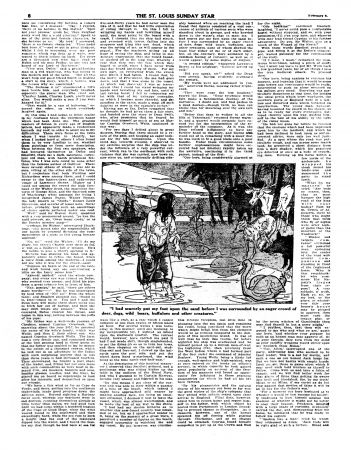Cyprian Overbeck Wells. A Literary Mosaic
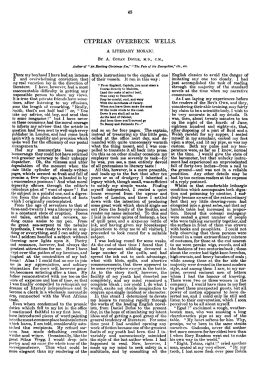

Cyprian Overbeck Wells. A Literary Mosaic is a short story written by Arthur Conan Doyle first published in The Boy's Own Paper in December 1886. Also published as "Cyprian Overbeck Wells".
Editions
- in The Boy's Own Paper (christmas 1886 [UK]) as Cyprian Overbeck Wells. A Literary Mosaic
- in The Captain of the Polestar and Other Tales (6 march 1890, Longmans, Green & Co. [UK/US])
- in The Captain of the Polestar and Other Tales (april 1890, Longmans, Green & Co. [US])
- in The Captain of the Polestar and Other Tales (august 1891, Bernhard Tauchnitz No. 2762 [DE])
- in The Captain of the Polestar and Other Tales (1896, Longmans, Green & Co. Colonial Library)
- in Derniers Mystères et Aventures (1911, P.-V. Stock [FR]) as Cyprien Overbeck-Wells
- in The St. Louis Star (4 february 1912 [US]) 2 ill.
- in Raffles Haw (1914, Pierre Lafitte [FR]) as Cyprian Overbeck Wells, Mosaïque Littéraire, 4 ill. by Louis Bailly
- in Derniers Mystères et Aventures (ca. 1920-1923, L'Édition Française Illustrée [FR]) as Cyprien Overbeck-Wells
- in Tales of Twilight and the Unseen (27 july 1922, John Murray [UK])
- in The Great Keinplatz Experiment and Other Tales of Twilight and the Unseen (autumn 1925, George H. Doran Co. [US])
Illustrations
- Illustration in The St. Louis Star (4 february 1912)
-
"I had scarcely put my foot upon the sand before I was surrounded by an eager crowd of deer, dogs, wild boars, buffaloes and other creatures."
-
"'What, ho, my masters!' he cried, 'are beds so scarce, then, that ye must hamper the highroad of the King with your bodies?'"
- Illustrations by Louis Bailly (Pierre Lafitte, 1914)
-
Nothing came amiss to my pen.
-
A quarrel would certainly have ensued.
-
Here he rummaged among a great pile of papers in front of him.
-
My wife exhorted me to choose some more seasonable spot.
Plot summary (spoiler)
The narrator of the story is passionate about writing. He decides to take a few weeks to write a masterpiece but inspiration does not come. One evening after supper he falls asleep and dreams that the greatest writers of the last few centuries are invited at his table to create a story: William Defoe, Tobias Smollett, Jonathan Swift, Henry Fielding, Samuel Richardson, Lawrence Sterne, Sir Walter Scott, George Eliot, William M. Thackeray, James Payn, Walter Besant, a lady known as "Ouida", Robert Louis Stevenson, Edward Bulwer-Lytton and Captain Marryat. Defoe tells the story of a man called Cyprian Overbeck Wells who during a storm saw his crew abandon the ship and he found himself alone on the boat... Dean Swift continues the story: After two days of drift he landed on a strange island where the animals were not afraid at all of human presence... Smollett continues: Wells preferred to return to the ship and continue his journey. A little further on, he is rescued by a British warship and enlisted as a serving officer. The crew mutinied and killed the captain. Then the boat returns home... Sir Walter Scott continues the story transposing it in the Middle Ages: once on land Wells decided to visit his parents. On the road to London, he was ambushed... Edward Bulwer-Lytton continues: Wells was captured and taken to the camp of the brigands and locked in a ruined building. Suddenly, an old scholar in white dress entered through a back door and started to recite a incomprehensible mystical text... Smollett and Scott mocks the style of Bulwer-Lytton, who, annoyed, leaves the table. The narrator does not know the rest of the story because he was then awakened by his wife.
Cyprian Overbeck Wells. A Literary Mosaic


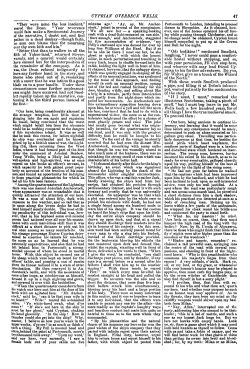


From my boyhood I have had an intense and overwhelming conviction that my real vocation lay in the direction of literature. I have, however, had a most unaccountable difficulty in getting any responsible person to share my views. It is true that private friends have sometimes, after listening to my effusions, gone the length of remarking, "Really, Smith, that's not half bad!" or, "You take my advice, old boy, and send that to some magazine!" but I have never on these occasions had the moral courage to inform my adviser that the article in question had been sent to well-nigh every publisher in London, and had come back again with a rapidity and precision which spoke well for the efficiency of our postal arrangements.
Had my manuscripts been paper boomerangs they could not have returned with greater accuracy to their unhappy dispatcher. Oh, the vileness and utter degradation of the moment when the stale little cylinder of closely written pages, which seemed so fresh and full of promise a few days ago, is handed in by a remorseless postman! And what moral depravity shines through the editor's ridiculous plea of "want of space!" But the subject is a painful one, and a digression from the plain statement of facts which I originally contemplated.
From the age of seventeen to that of three-and-twenty I was a literary volcano in a constant state of eruption. Poems and tales, articles and reviews, nothing came amiss to my pen. From the great sea-serpent to the nebular hypothesis, I was ready to write on anything or everything, and I can safely say that I seldom handled a subject without throwing new lights upon it. Poetry and romance, however, had always the greatest attractions for me. How I have wept over the pathos of my heroines, and laughed at the comicalities of my buffoons! Alas! I could find no one to join me in my appreciation, and solitary admiration for one's self, however genuine, becomes satiating after a time. My father remonstrated with me too on the score of expense and loss of time, so that I was finally compelled to relinquish my dreams of literary independence and to become a clerk in a wholesale mercantile firm connected with the West African trade.
Even when condemned to the prosaic duties which fell to my lot in the office, I continued faithful to my first love. I have introduced pieces of word-painting into the most commonplace business letters which have, I am told, considerably astonished the recipients. My refined sarcasm has made defaulting creditors writhe and wince. Occasionally, like the great Silas Wegg, I would drop into poetry, and so raise the whole tone of the correspondence. Thus what could be more elegant than my rendering of the firm's instructions to the captain of one of their vessels. It ran in this way:—
"From England, Captain, you must steer a
Course directly to Madeira,
Land the casks of salted beef,
Then away to Teneriffe.
Pray be careful, cool, and wary
With the merchants of Canary.
When you leave them make the most
Of the trade winds to the coast.
Down it you shall sail as far
As the land of Calabar,
And from there you'll onward go
To Bonny and Fernando Po—"
and so on for four pages. The captain, instead of treasuring up this little gem, called at the office next day, and demanded with quite unnecessary warmth what the thing meant, and I was compelled to translate it all back into prose. On this, as on other similar occasions, my employer took me severely to task—for he was, you see, a man entirely devoid of all pretensions to literary taste!
All this, however, is a mere preamble, and leads up to the fact that after ten years or so of drudgery I inherited a legacy which, though small, was sufficient to satisfy my simple wants. Finding myself independent, I rented a quiet house removed from the uproar and bustle of London, and there I settled down with the intention of producing some great work which should single me out from the family of the Smiths, and render my name immortal. To this end I laid in several quires of foolscap, a box of quill pens, and a sixpenny bottle of ink, and having given my housekeeper injunctions to deny me to all visitors, I proceeded to look round for a suitable subject.
I was looking round for some weeks. At the end of that time I found that I had by constant nibbling devoured a large number of the quills, and had spread the ink out to such advantage, what with blots, spills, and abortive commencements, that there appeared to be some everywhere except in the bottle. As to the story itself, however, the facility of my youth had deserted me completely, and my mind remained a complete blank; nor could I, do what I would, excite my sterile imagination to conjure up a single incident or character.
In this strait I determined to devote my leisure to running rapidly through the works of the leading English novelists, from Daniel Defoe to the present day, in the hope of stimulating my latent ideas and of getting a good grasp of the general tendency of literature. For some time past I had avoided opening any work of fiction because one of the greatest faults of my youth had been that I invariably and unconsciously mimicked the style of the last author whom I had happened to read. Now, however, I made up my mind to seek safety in a multitude, and by consulting ALL the English classics to avoid the danger of imitating any one too closely. I had just accomplished the task of reading through the majority of the standard novels at the time when my narrative commences.
It was, then, about twenty minutes to ten on the night of the fourth of June, eighteen hundred and eighty-six, that, after disposing of a pint of beer and a Welsh rarebit for my supper, I seated myself in my arm-chair, cocked my feet upon a stool, and lit my pipe, as was my custom. Both my pulse and my temperature were, as far as I know, normal at the time. I would give the state of the barometer, but that unlucky instrument had experienced an unprecedented fall of forty-two inches—from a nail to the ground —and was not in a reliable condition. We live in a scientific age, and I flatter myself that I move with the times.
Whilst in that comfortable lethargic condition which accompanies both digestion and poisoning by nicotine, I suddenly became aware of the extraordinary fact that my little drawing-room had elongated into a great salon, and that my humble table had increased in proportion. Round this colossal mahogany were seated a great number of people who were talking earnestly together, and the surface in front of them was strewn with books and pamphlets. I could not help observing that these persons were dressed in a most extraordinary mixture of costumes, for those at the end nearest to me wore peruke wigs, swords, and all the fashions of two centuries back; those about the centre had tight knee-breeches, high cravats, and heavy bunches of seals; while among those at the far side the majority were dressed in the most modern style, and among them I saw, to my surprise, several eminent men of letters whom I had the honour of knowing. There were two or three women in the company. I should have risen to my feet to greet these unexpected guests, but all power of motion appeared to have deserted me, and I could only lie still and listen to their conversation, which I soon perceived to be all about myself.
"Egad!" exclaimed a rough, weather-beaten man, who was smoking a long churchwarden pipe at my end of the table, "my heart softens for him. Why, gossips, we've been in the same straits ourselves. Gadzooks, never did mother feel more concern for her eldest born than I when Rory Random went out to make his own way in the world. "
"Right, Tobias, right!" cried another man, seated at my very elbow.
"By my troth, I lost more flesh over poor Robin on his island, than had I the sweating sickness twice told. The tale was well-nigh done when in swaggers my Lord of Rochester—a merry gallant, and one whose word in matters literary might make or mar. 'How now, Defoe,' quoth he, 'hast a tale on hand? Even so, your lordship,' I returned. 'A right merry one, I trust,' quoth he. 'Discourse unto me concerning thy heroine, a comely lass, Dan, or I mistake. ' 'Nay,' I replied, 'there is no heroine in the matter. Split not your phrases,' quoth he; 'thou weighest every word like a scald attorney. Speak to me of thy principal female character, be she heroine or no. My lord,' I answered, 'there is no female character. Then out upon thyself and thy book too!' he cried. 'Thou hadst best burn it!'—and so out in great dudgeon, whilst I fell to mourning over my poor romance, which was thus, as it were, sentenced to death before its birth. Yet there are a thousand now who have read of Robin and his man Friday, to one who has heard of my Lord of Rochester. "
"Very true, Defoe," said a genial-looking man in a red waistcoat, who was sitting at the modern end of the table. "But all this won't help our good friend Smith in making a start at his story, which, I believe, was the reason why we assembled. "
"The Dickens it is!" stammered a little man beside him, and everybody laughed, especially the genial man, who cried out, "Charley Lamb, Charley Lamb, you'll never alter. You would make a pun if you were hanged for it. "
"That would be a case of haltering," returned the other, on which everybody laughed again.
By this time I had begun to dimly realise in my confused brain the enormous honour which had been done me. The greatest masters of fiction in every age of English letters had apparently made a rendezvous beneath my roof, in order to assist me in my difficulties. There were many faces at the table whom I was unable to identify; but when I looked hard at others I often found them to be very familiar to me, whether from paintings or from mere description. Thus between the first two speakers, who had betrayed themselves as Defoe and Smollett, there sat a dark, saturnine corpulent old man, with harsh prominent features, who I was sure could be none other than the famous author of Gulliver. There were several others of whom I was not so sure, sitting at the other side of the table, but I conjecture that both Fielding and Richardson were among them, and I could swear to the lantern-jaws and cadaverous visage of Lawrence Sterne. Higher up I could see among the crowd the high forehead of Sir Walter Scott, the masculine features of George Eliott, and the flattened nose of Thackeray; while amongst the living I recognised James Payn, Walter Besant, the lady known as "Ouida," Robert Louis Stevenson, and several of lesser note. Never before, probably, had such an assemblage of choice spirits gathered under one roof.
"Well," said Sir Walter Scott, speaking with a pronounced accent, "ye ken the auld proverb, sirs, 'Ower mony cooks,' or as the Border minstrel sang—
'Black Johnstone wi' his troopers ten Might mak' the heart turn cauld, But Johnstone when he's a' alane Is waur ten thoosand fauld.'
The Johnstones were one of the Redesdale families, second cousins of the Armstrongs, and connected by marriage to—"
"Perhaps, Sir Walter," interrupted Thackeray, "you would take the responsibility off our hands by yourself dictating the commencement of a story to this young literary aspirant. "
"Na, na!" cried Sir Walter; "I'll do my share, but there's Chairlie over there as full o' wut as a Radical's full o' treason. He's the laddie to give a cheery opening to it. "
Dickens was shaking his head, and apparently about to refuse the honour, when a voice from among the moderns—I could not see who it was for the crowd—said:
"Suppose we begin at the end of the table and work round, any one contributing a little as the fancy seizes him?"
"Agreed! agreed!" cried the whole company; and every eye was turned on Defoe, who seemed very uneasy, and filled his pipe from a great tobacco-box in front of him.
"Nay, gossips," he said, "there are others more worthy—"But he was interrupted by loud cries of "No! no!" from the whole table; and Smollett shouted out, "Stand to it, Dan — stand to it! You and I and the Dean here will make three short tacks just to fetch her out of harbour, and then she may drift where she pleases. "Thus encouraged, Defoe cleared his throat, and began in this way, talking between the puffs of his pipe:—
"My father was a well-to-do yeoman of Cheshire, named Cyprian Overbeck, but, marrying about the year 1617, he assumed the name of his wife's family, which was Wells; and thus I, their eldest son, was named Cyprian Overbeck Wells. The farm was a very fertile one, and contained some of the best grazing land in those parts, so that my father was enabled to lay by money to the extent of a thousand crowns, which he laid out in an adventure to the Indies with such surprising success that in less than three years it had increased fourfold. Thus encouraged, he bought a part share of the trader, and, fitting her out once more with such commodities as were most in demand (viz. , old muskets, hangers and axes, besides glasses, needles, and the like), he placed me on board as supercargo to look after his interests, and despatched us upon our voyage.
"We had a fair wind as far as Cape de Verde, and there, getting into the north-west trade-winds, made good progress down the African coast. Beyond sighting a Barbary rover once, whereat our mariners were in sad distress, counting themselves already as little better than slaves, we had good luck until we had come within a hundred leagues of the Cape of Good Hope, when the wind veered round to the southward and blew exceeding hard, while the sea rose to such a height that the end of the mainyard dipped into the water, and I heard the master say that though he had been at sea for five-and-thirty years he had never seen the like of it, and that he had little expectation of riding through it. On this I fell to wringing my hands and bewailing myself, until the mast going by the board with a crash, I thought that the ship had struck, and swooned with terror, falling into the scuppers and lying like one dead, which was the saving of me, as will appear in the sequel. For the mariners, giving up all hope of saving the ship, and being in momentary expectation that she would founder, pushed off in the long-boat, whereby I fear that they met the fate which they hoped to avoid, since I have never from that day heard anything of them. For my own part, on recovering from the swoon into which I had fallen, I found that, by the mercy of Providence, the sea had gone down, and that I was alone in the vessel. At which last discovery I was so terror-struck that I could but stand wringing my hands and bewailing my sad fate, until at last taking heart, I fell to comparing my lot with that of my unhappy camerados, on which I became more cheerful, and descending to the cabin, made a meal off such dainties as were in the captain's locker. "
Having got so far, Defoe remarked that he thought he had given them a fair start, and handed over the story to Dean Swift, who, after premising that he feared he would find himself as much at sea as Master Cyprian Overbeck Wells, continued in this way:—
"For two days I drifted about in great distress, fearing that there should be a return of the gale, and keeping an eager look-out for my late companions. Upon the third day, towards evening, I observed to my extreme surprise that the ship was under the influence of a very powerful current, which ran to the north-east with such violence that she was carried, now bows on, now stern on, and occasionally drifting sideways like a crab, at a rate which I cannot compute at less than twelve or fifteen knots an hour. For several weeks I was borne away in this manner, until one morning, to my inexpressible joy, I sighted an island upon the starboard quarter. The current would, however, have carried me past it had I not made shift, though single-handed, to set the flying-jib so as to turn her bows, and then clapping on the sprit-sail, studding-sail, and fore-sail, I clewed up the halliards upon the port side, and put the wheel down hard a-starboard, the wind being at the time north-east-half-east. "
At the description of this nautical manoeuvre I observed that Smollett grinned, and a gentleman who was sitting higher up the table in the uniform of the Royal Navy, and who I guessed to be Captain Marryat, became very uneasy and fidgeted in his seat.
"By this means I got clear of the current and was able to steer within a quarter of a mile of the beach, which indeed I might have approached still nearer by making another tack, but being an excellent swimmer, I deemed it best to leave the vessel, which was almost waterlogged, and to make the best of my way to the shore.
"I had had my doubts hitherto as to whether this new-found country was inhabited or no, but as I approached nearer to it, being on the summit of a great wave, I perceived a number of figures on the beach, engaged apparently in watching me and my vessel. My joy, however, was considerably lessened when on reaching the land I found that the figures consisted of a vast concourse of animals of various sorts who were standing about in groups, and who hurried down to the water's edge to meet me. I had scarce put my foot upon the sand before I was surrounded by an eager crowd of deer, dogs, wild boars, buffaloes, and other creatures, none of whom showed the least fear either of me or of each other, but, on the contrary, were animated by a common feeling of curiosity, as well as, it would appear, by some degree of disgust. "
"A second edition," whispered Lawrence Sterne to his neighbour; "Gulliver served up cold. "
"Did you speak, sir?"asked the Dean very sternly, having evidently overheard the remark.
"My words were not addressed to you, sir," answered Sterne, looking rather frightened.
"They were none the less insolent," roared the Dean. "Your reverence would fain make a Sentimental Journey of the narrative, I doubt not, and find pathos in a dead donkey—though faith, no man can blame thee for mourning over thy own kith and kin. "
"Better that than to wallow in all the filth of Yahoo-land," returned Sterne warmly, and a quarrel would certainly have ensued but for the interposition of the remainder of the company. As it was, the Dean refused indignantly to have any further hand in the story, and Sterne also stood out of it, remarking with a sneer that he was loth to fit a good blade on to a poor handle. Under these circumstances some further unpleasantness might have occurred had not Smollett rapidly taken up the narrative, continuing it in the third person instead of the first:—
"Our hero, being considerably alarmed at this strange reception, lost little time in plunging into the sea again and regaining his vessel, being convinced that the worst which might befall him from the elements would be as nothing compared to the dangers of this mysterious island. It was as well that he took this course, for before nightfall his ship was overhauled and he himself picked up by a British man-of-war, the Lightning, then returning from the West Indies, where it had formed part of the fleet under the command of Admiral Benbow. Young Wells, being a likely lad enough, well-spoken and high-spirited, was at once entered on the books as officer's servant, in which capacity he both gained great popularity on account of the freedom of his manners, and found an opportunity for indulging in those practical pleasantries for which he had all his life been famous.
"Among the quartermasters of the Lightning there was one named Jedediah Anchorstock, whose appearance was so remarkable that it quickly attracted the attention of our hero. He was a man of about fifty, dark with exposure to the weather, and so tall that as he came along the 'tween decks he had to bend himself nearly double. The most striking peculiarity of this individual was, however, that in his boyhood some evil-minded person had tattooed eyes all over his countenance with such marvellous skill that it was difficult at a short distance to pick out his real ones among so many counterfeits. On this strange personage Master Cyprian determined to exercise his talents for mischief, the more so as he learned that he was extremely superstitious, and also that he had left behind him in Portsmouth a strong-minded spouse of whom he stood in mortal terror. With this object he secured one of the sheep which were kept on board for the officers' table, and pouring a can of rumbo down its throat, reduced it to a state of utter intoxication. He then conveyed it to Anchorstock's berth, and with the assistance of some other imps, as mischievous as himself, dressed it up in a high nightcap and gown, and covered it over with the bedclothes.
"When the quartermaster came down from his watch our hero met him at the door of his berth with an agitated face. 'Mr. Anchorstock,' said he, 'can it be that your wife is on board? Wife!' roared the astonished sailor. 'Ye white-faced swab, what d'ye mean? If she's not here in the ship it must be her ghost,' said Cyprian, shaking his head gloomily. 'In the ship! How in thunder could she get into the ship? Why, master, I believe as how you're weak in the upper works, d'ye see? to as much as think o' such a thing. My Poll is moored head and starn, behind the point at Portsmouth, more'n two thousand mile away. Upon my word,' said our hero, very earnestly, 'I saw a female look out of your cabin not five minutes ago. Ay, ay, Mr. Anchorstock,' joined in several of the conspirators. 'We all saw her — a spanking-looking craft with a dead-light mounted on one side. Sure enough,' said Anchorstock, staggered by this accumulation of evidence, 'my Polly's starboard eye was doused for ever by long Sue Williams of the Hard. But if so be as she be there I must see her, be she ghost or quick;' with which the honest sailor, in much perturbation and trembling in every limb, began to shuffle forward into the cabin, holding the light well in front of him. It chanced, however, that the unhappy sheep, which was quietly engaged in sleeping off the effects of its unusual potations, was awakened by the noise of this approach, and finding herself in such an unusual position, sprang out of the bed and rushed furiously for the door, bleating wildly, and rolling about like a brig in a tornado, partly from intoxication and partly from the night-dress which impeded her movements. As Anchorstock saw this extraordinary apparition bearing down upon him, he uttered a yell and fell flat upon his face, convinced that he had to do with a supernatural visitor, the more so as the confederates heightened the effect by a chorus of most ghastly groans and cries.
The joke had nearly gone beyond what was originally intended, for the quartermaster lay as one dead, and it was only with the greatest difficulty that he could be brought to his senses. To the end of the voyage he stoutly asserted that he had seen the distant Mrs. Anchorstock, remarking with many oaths that though he was too woundily scared to take much note of the features, there was no mistaking the strong smell of rum which was characteristic of his better half.
"It chanced shortly after this to be the king's birthday, an event which was signalised aboard the Lightening by the death of the commander under singular circumstances. This officer, who was a real fair-weather Jack, hardly knowing the ship's keel from her ensign, had obtained his position through parliamentary interest, and used it with such tyranny and cruelty that he was universally execrated. So unpopular was he that when a plot was entered into by the whole crew to punish his misdeeds with death, he had not a single friend among six hundred souls to warn him of his danger. It was the custom on board the king's ships that upon his birthday the entire ship's company should be drawn up upon deck, and that at a signal they should discharge their muskets into the air in honour of his Majesty. On this occasion word had been secretly passed round for every man to slip a slug into his firelock, instead of the blank cartridge provided. On the boatswain blowing his whistle the men mustered upon deck and formed line, whilst the captain, standing well in front of them, delivered a few words to them. 'When I give the word,' he concluded, 'you shall discharge your pieces, and by thunder, if any man is a second before or a second after his fellows I shall trice him up to the weather rigging! 'With these words he roared 'Fire!' on which every man levelled his musket straight at his head and pulled the trigger. So accurate was the aim and so short the distance, that more than five hundred bullets struck him simultaneously, blowing away his head and a large portion of his body. There were so many concerned in this matter, and it was so hopeless to trace it to any individual, that the officers were unable to punish any one for the affair—the more readily as the captain's haughty ways and heartless conduct had made him quite as hateful to them as to the men whom they commanded.
"By his pleasantries and the natural charm of his manners our hero so far won the good wishes of the ship's company that they parted with infinite regret upon their arrival in England. Filial duty, however, urged him to return home and report himself to his father, with which object he posted from Portsmouth to London, intending to proceed thence to Shropshire. As it chanced, however, one of the horses sprained his off foreleg while passing through Chichester, and as no change could be obtained, Cyprian found himself compelled to put up at the Crown and Bull for the night.
"Ods bodikins!" continued Smollett, laughing, "I never could pass a comfortable hostel without stopping, and so, with your permission, I'll e'en stop here, and whoever wills may lead friend Cyprian to his further adventures. Do you, Sir Walter, give us a touch of the Wizard of the North. "
With these words Smollett produced a pipe, and filling it at Defoe's tobacco-pot, waited patiently for the continuation of the story.
"If I must, I must," remarked the illustrious Scotchman, taking a pinch of snuff; "but I must beg leave to put Mr. Wells back a few hundred years, for of all things I love the true mediaeval smack. To proceed then:—
"Our hero, being anxious to continue his journey, and learning that it would be some time before any conveyance would be ready, determined to push on alone mounted on his gallant grey steed. Travelling was particularly dangerous at that time, for besides the usual perils which beset wayfarers, the southern parts of England were in a lawless and disturbed state which bordered on insurrection. The young man, however, having loosened his sword in his sheath, so as to be ready for every eventuality, galloped cheerily upon his way, guiding himself to the best of his ability by the light of the rising moon.
"He had not gone far before he realised that the cautions which had been impressed upon him by the landlord, and which he had been inclined to look upon as self-interested advice, were only too well justified. At a spot where the road was particularly rough, and ran across some marsh land, he perceived a short distance from him a dark shadow, which his practised eye detected at once as a body of crouching men. Reining up his horse within a few yards of the ambuscade, he wrapped his cloak round his bridle-arm and summoned the party to stand forth.
"'What ho, my masters!' he cried. 'Are beds so scarce, then, that ye must hamper the high road of the king with your bodies? Now, by St. Ursula of Alpuxerra, there be those who might think that birds who fly o' nights were after higher game than the moorhen or the woodcock!'
"'Blades and targets, comrades!' exclaimed a tall powerful man, springing into the centre of the road with several companions, and standing in front of the frightened horse. 'Who is this swashbuckler who summons his Majesty's lieges from their repose? A very soldado, o' truth. Hark ye, sir, or my lord, or thy grace, or whatsoever title your honour's honour may be pleased to approve, thou must curb thy tongue play, or by the seven witches of Gambleside thou may find thyself in but a sorry plight.'
"'I prythee, then, that thou wilt expound to me who and what ye are,' quoth our hero, 'and whether your purpose be such as an honest man may approve of. As to your threats, they turn from my mind as your caitiffly weapons would shiver upon my hauberk from Milan.'
"'Nay, Allen,' interrupted one of the party, addressing him who seemed to be their leader; 'this is a lad of mettle, and such a one as our honest Jack longs for. But we lure not hawks with empty hands. Look ye, sir, there is game afoot which it may need such bold hunters as thyself to follow. Come with us and take a firkin of canary, and we will find better work for that glaive of thine than getting its owner into broil and bloodshed; for, by my troth! Milan or no Milan, if my curtel axe do but ring against that morion of thine it will be an ill day for thy father's son.'
"For a moment our hero hesitated as to whether it would best become his knightly traditions to hurl himself against his enemies, or whether it might not be better to obey their requests. Prudence, mingled with a large share of curiosity, eventually carried the day, and dismounting from his horse, he intimated that he was ready to follow his captors.
"'Spoken like a man!' cried he whom they addressed as Allen. 'Jack Cade will be right glad of such a recruit. Blood and carrion! but thou hast the thews of a young ox; and I swear, by the haft of my sword, that it might have gone ill with some of us hadst thou not listened to reason!'
"'Nay, not so, good Allen—not so,' squeaked a very small man, who had remained in the background while there was any prospect of a fray, but who now came pushing to the front. 'Hadst thou been alone it might indeed have been so, perchance, but an expert swordsman can disarm at pleasure such a one as this young knight. Well I remember in the Palatinate how I clove to the chine even such another—the Baron von Slogstaff. He struck at me, look ye, so; but I, with buckler and blade, did, as one might say, deflect it; and then, countering in carte, I returned in tierce, and so—St. Agnes save us! who comes here? '
"The apparition which frightened the loquacious little man was sufficiently strange to cause a qualm even in the bosom of the knight. Through the darkness there loomed a figure which appeared to be of gigantic size, and a hoarse voice, issuing apparently some distance above the heads of the party, broke roughly on the silence of the night.
"'Now out upon thee, Thomas Allen, and foul be thy fate if thou hast abandoned thy post without good and sufficient cause. By St. Anselm of the Holy Grove, thou hadst best have never been born than rouse my spleen this night. Wherefore is it that you and your men are trailing over the moor like a flock of geese when Michaelmas is near? '
"'Good captain,' said Allen, doffing his bonnet, an example followed by others of the band, 'we have captured a goodly youth who was pricking it along the London road. Methought that some word of thanks were meet reward for such service, rather than taunt or threat.'
"'Nay, take it not to heart, bold Allen,' exclaimed their leader, who was none other than the great Jack Cade himself. 'Thou knowest of old that my temper is somewhat choleric, and my tongue not greased with that unguent which oils the mouths of the lip-serving lords of the land. And you,' he continued, turning suddenly upon our hero, 'are you ready to join the great cause which will make England what it was when the learned Alfred reigned in the land? Zounds, man, speak out, and pick not your phrases.'
"'I am ready to do aught which may become a knight and a gentleman,' said the soldier stoutly.
"'Taxes shall be swept away!' cried Cade excitedly — 'the impost and the anpost — the tithe and the hundred-tax. The poor man's salt-box and flour-bin shall be as free as the nobleman's cellar. Ha! what sayest thou?'
"'It is but just,' said our hero.
"'Ay, but they give us such justice as the falcon gives the leveret!' roared the orator. 'Down with them, I say—down with every man of them! Noble and judge, priest and king, down with them all!'
"'Nay,' said Sir Overbeck Wells, drawing himself up to his full height, and laying his hand upon the hilt of his sword, 'there I cannot follow thee, but must rather defy thee as traitor and faineant, seeing that thou art no true man, but one who would usurp the rights of our master the king, whom may the Virgin protect!'
"At these bold words, and the defiance which they conveyed, the rebels seemed for a moment utterly bewildered; but, encouraged by the hoarse shout of their leader, they brandished their weapons and prepared to fall upon the knight, who placed himself in a posture for defence and awaited their attack.
"There now!" cried Sir Walter, rubbing his hands and chuckling, "I've put the chiel in a pretty warm corner, and we'll see which of you moderns can take him oot o't. Ne'er a word more will ye get frae me to help him one way or the other. "
"You try your hand, James," cried several voices, and the author in question had got so far as to make an allusion to a solitary horseman who was approaching, when he was interrupted by a tall gentleman a little farther down with a slight stutter and a very nervous manner.
"Excuse me," he said, "but I fancy that I may be able to do something here. Some of my humble productions have been said to excel Sir Walter at his best, and I was undoubtedly stronger all round. I could picture modern society as well as ancient; and as to my plays, why Shakespeare never came near 'The Lady of Lyons' for popularity. There is this little thing—" (Here he rummaged among a great pile of papers in front of him). "Ah! that's a report of mine, when I was in India! Here it is. No, this is one of my speeches in the House, and this is my criticism on Tennyson. Didn't I warm him up? I can't find what I wanted, but of course you have read them all—'Rienzi,' and 'Harold,' and 'The Last of the Barons.' Every schoolboy knows them by heart, as poor Macaulay would have said. Allow me to give you a sample:—
"In spite of the gallant knight's valiant resistance the combat was too unequal to be sustained. His sword was broken by a slash from a brown bill, and he was borne to the ground. He expected immediate death, but such did not seem to be the intention of the ruffians who had captured him. He was placed upon the back of his own charger and borne, bound hand and foot, over the trackless moor, in the fastnesses of which the rebels secreted themselves.
"In the depths of these wilds there stood a stone building which had once been a farm-house, but having been for some reason abandoned had fallen into ruin, and had now become the headquarters of Cade and his men. A large cowhouse near the farm had been utilised as sleeping quarters, and some rough attempts had been made to shield the principal room of the main building from the weather by stopping up the gaping apertures in the walls. In this apartment was spread out a rough meal for the returning rebels, and our hero was thrown, still bound, into an empty outhouse, there to await his fate."
Sir Walter had been listening with the greatest impatience to Bulwer Lytton's narrative, but when it had reached this point he broke in impatiently.
"We want a touch of your own style, man," he said. "The animal-magnetico- electro-hysterical-biological-mysterious sort of story is all your own, but at present you are just a poor copy of myself, and nothing more."
There was a murmur of assent from the company, and Defoe remarked, "Truly, Master Lytton, there is a plaguey resemblance in the style, which may indeed be but a chance, and yet methinks it is sufficiently marked to warrant such words as our friend hath used."
"Perhaps you will think that this is an imitation also," said Lytton bitterly, and leaning back in his chair with a morose countenance, he continued the narrative in this way:—
"Our unfortunate hero had hardly stretched himself upon the straw with which his dungeon was littered, when a secret door opened in the wall and a venerable old man swept majestically into the apartment. The prisoner gazed upon him with astonishment not unmixed with awe, for on his broad brow was printed the seal of much knowledge—such knowledge as it is not granted to the son of man to know. He was clad in a long white robe, crossed and chequered with mystic devices in the Arabic character, while a high scarlet tiara marked with the square and circle enhanced his venerable appearance. 'My son,' he said, turning his piercing and yet dreamy gaze upon Sir Overbeck, 'all things lead to nothing, and nothing is the foundation of all things. Cosmos is impenetrable. Why then should we exist?'
"Astounded at this weighty query, and at the philosophic demeanour of his visitor, our hero made shift to bid him welcome and to demand his name and quality. As the old man answered him his voice rose and fell in musical cadences, like the sighing of the east wind, while an ethereal and aromatic vapour pervaded the apartment.
"'I am the eternal non-ego,' he answered. "I am the concentrated negative —the everlasting essence of nothing. You see in me that which existed before the beginning of matter many years before the commencement of time. I am the algebraic x which represents the infinite divisibility of a finite particle.'
"Sir Overbeck felt a shudder as though an ice-cold hand had been placed upon his brow. 'What is your message?' he whispered, falling prostrate before his mysterious visitor.
"'To tell you that the eternities beget chaos, and that the immensities are at the mercy of the divine ananke. Infinitude crouches before a personality. The mercurial essence is the prime mover in spirituality, and the thinker is powerless before the pulsating inanity. The cosmical procession is terminated only by the unknowable and unpronounceable'—
"May I ask, Mr. Smollett, what you find to laugh at?"
"Gad zooks, master," cried Smollett, who had been sniggering for some time back. "It seems to me that there is little danger of any one venturing to dispute that style with you. "
"It's all your own," murmured Sir Walter.
"And very pretty, too," quoth Lawrence Sterne, with a malignant grin. "Pray sir, what language do you call it?"
Lytton was so enraged at these remarks, and at the favour with which they appeared to be received, that he endeavoured to stutter out some reply, and then, losing control of himself completely, picked up all his loose papers and strode out of the room, dropping pamphlets and speeches at every step. This incident amused the company so much that they laughed for several minutes without cessation. Gradually the sound of their laughter sounded more and more harshly in my ears, the lights on the table grew dim and the company more misty, until they and their symposium vanished away altogether. I was sitting before the embers of what had been a roaring fire, but was now little more than a heap of grey ashes, and the merry laughter of the august company had changed to the recriminations of my wife, who was shaking me violently by the shoulder and exhorting me to choose some more seasonable spot for my slumbers. So ended the wondrous adventures of Master Cyprian Overbeck Wells, but I still live in the hopes that in some future dream the great masters may themselves finish that which they have begun.
More sources
- The St. Louis Star (4 february 1912)
-
Fiction Section, p. 7
-
Fiction Section, p. 8
-
Fiction Section, p. 9
